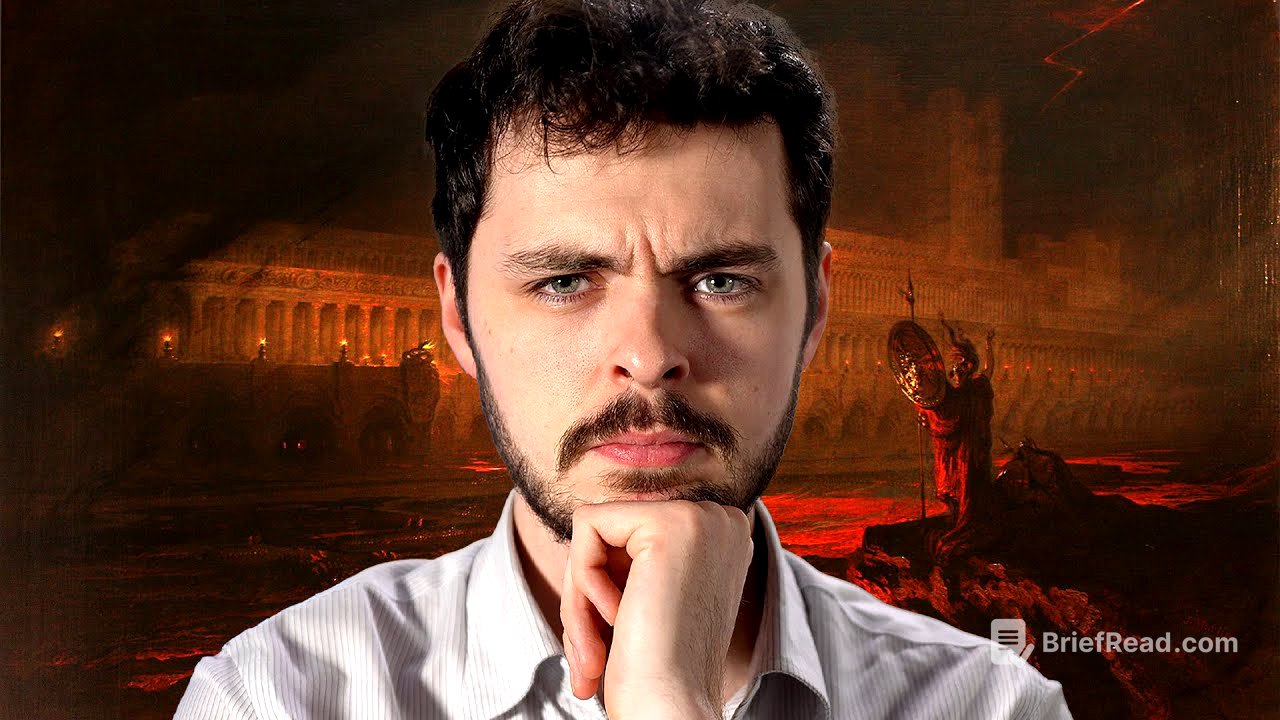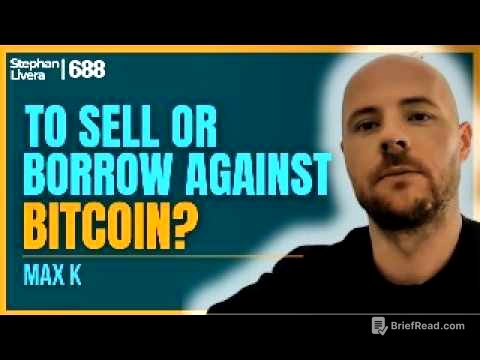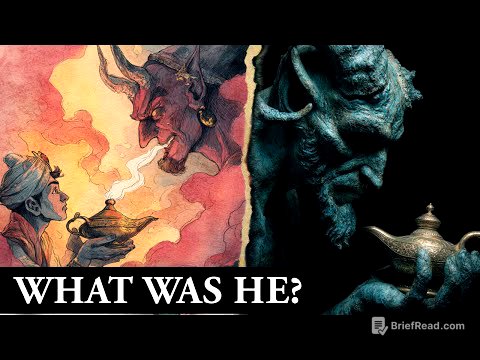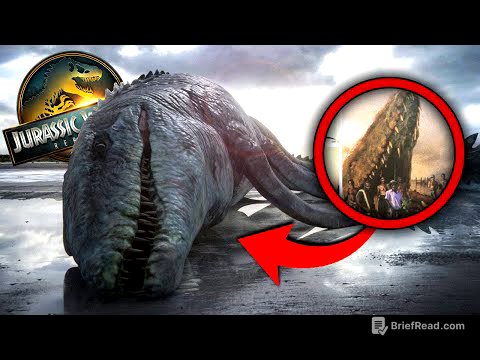TLDR;
This video is a response to a video titled "All Atheist Arguments Answered in 10 Minutes" by the YouTube channel Redeemed Zuma. Alex O'Connor, the creator of the channel, addresses and critiques each point made in the original video, offering counter-arguments and additional context. The main topics covered include the relationship between religion and war, the problem of evil, the existence of God, and the historical accuracy of the Bible.
- Religion's role in wars is not as significant as claimed.
- Atheist violence is not motivated by atheism.
- The problem of evil and suffering remains a challenge to theism.
- The Bible contains contradictions and supports slavery.
- Faith is not opposed to reason.
Religion causes wars [0:00]
The original video claims that religion only causes a small percentage of wars. O'Connor counters that even if the percentage is small, it's still a problem that religion causes any wars at all. He uses the example of national socialism causing one war to illustrate that even a single war caused by an ideology is significant. He also questions whether introducing religious conviction into a non-religious conflict would calm or worsen the situation, suggesting that many religions can exacerbate conflicts.
People do evil in the name of religion [1:30]
The original video argues that atheists have also been murderous, so this isn't an argument against religion. O'Connor responds that religious violence is motivated by religious beliefs, whereas atheist violence is rarely motivated by atheism itself. He discusses Hitler's religious views, noting that even if Hitler was an atheist, he recognized the power of religious belief in motivating people to do evil, as evidenced by the "God With Us" inscriptions on Nazi soldiers' belt buckles.
If you lived elsewhere, you’d be an atheist [2:58]
The original video states that everyone's beliefs are shaped by their context, implying this negates the argument against religion. O'Connor argues that this misses the point. Atheists don't claim a God exists who wants everyone to believe in him. If such a God existed, it would be unlikely and unfair for belief to depend on geographic location. The fact that religious beliefs are shaped by local mythology is exactly what atheists would expect if there is no universal God.
How do you know which religion is true? [4:06]
The original video claims everyone has faith in a worldview, whether religious or secular. O'Connor agrees that every worldview should be justified.
There’s no scientific evidence for God [4:21]
The original video asserts that science cannot prove or disprove God because God is outside the natural world. O'Connor argues that this undercuts natural theology and disagrees with those who try to prove God's existence through scientific arguments like the fine-tuning argument or the Big Bang. He points out the inconsistency of using scientific arguments to prove God's existence while simultaneously claiming science cannot bear on the supernatural.
Demonic possession [6:06]
The original video claims there are medically documented cases of demonic possession. O'Connor challenges this, asking for medical documentation. He examines the book "Demonic Foes" by Richard Gallagher, the source provided, and finds the evidence anecdotal and unconvincing. He also points out the contradiction of using scientific evidence for demonic possession when it was previously stated that science cannot prove anything supernatural.
The Bible has contradictions [10:15]
The original video claims that every apparent contradiction in the Bible can be explained with theology. O'Connor disagrees, providing several examples of contradictions, such as the differing genealogies of Jesus in Matthew and Luke, the date of Jesus's crucifixion, and discrepancies in accounts of Jesus's resurrection. He argues that the proposed solutions to these contradictions are often theologically motivated and not the most natural interpretation of the text.
The Gospels are anonymous [13:49]
The original video states that the Gospels being anonymous doesn't mean we don't know who wrote them, citing church fathers who verified the authorship. O'Connor disputes this, focusing on St. Ignatius of Antioch, and argues that there is no clear endorsement from Ignatius verifying John's authorship of the fourth Gospel. He admits that church patristics is not his area of expertise and expresses interest in seeing the evidence for the claim.
The Gospels misquote Jesus [15:35]
The original video claims that scholars disagree on which quotes of Jesus are legitimate, so their skepticism can be dismissed. O'Connor argues that the lack of consensus among scholars is precisely the problem. He uses the analogy of trying to remember a sentence verbatim to illustrate how difficult it is to accurately recall information, especially considering the time gap between Jesus's death and the writing of the Gospels.
Jesus never claimed to be God [17:26]
The original video asserts that Jesus showed he was God through his actions. O'Connor references his podcast with Bart Ehrman on this topic, stating that Jesus seems to claim to be God in John's Gospel but less so in the synoptics. He examines the example of Jesus forgiving sins, arguing that if Jesus giving the apostles the power to forgive sins doesn't make them Gods, then the Father sending Jesus to forgive sins doesn't make him God either.
Mythological development [19:25]
The original video suggests that the later the Gospel, the more divine Jesus seems, implying Jesus was made more divine over time. O'Connor points out that Paul's letters, written before the Gospels, fully confess the divinity of Jesus, breaking this pattern. He notes that later Gospels provide more evidence for Jesus's divinity, such as post-resurrection appearances, but these accounts become more detailed and fanciful over time.
The Bible supports slavery [21:10]
The original video claims that just because there's slavery in the Bible doesn't mean the Bible supports it. O'Connor strongly disagrees, calling this the most untenable position in the video. He provides examples from the Old Testament that condone slavery, such as instructions on how to treat slaves and where to acquire them. He also points out that the New Testament doesn't abolish slavery but instead provides instructions for slaves to obey their masters.
The “Slave Bible” [24:39]
The original video argues that the existence of "slave Bibles," which omitted parts of the Bible, suggests the Bible doesn't support slavery. O'Connor counters that the fact that a slave Bible was created to promote and maintain slavery is itself a problem. He notes that the slave Bible omitted themes of freedom, but this doesn't negate the verses that condone slavery.
Christians supported slavery [25:42]
The original video claims that Christian civilization was the first to abolish slavery on moral grounds. O'Connor questions why it took so long for Christian society to abolish slavery if it was against God's will. He argues that while Christians today may condemn slavery, the Bible was used to defend it as an institution in the past.
God kills people in the Bible [27:10]
The original video responds that God is the giver of life and can take it, especially if people sin. O'Connor finds this a disturbing response to the problem of natural evil, questioning why God allows or causes suffering and death.
Atheist countries are more prosperous [27:39]
The original video argues that prosperity causes atheism, not the other way around, and that prosperous countries are rooted in Christian traditions. O'Connor questions how to measure a nation's prosperity without worldview assumptions. He notes that communist China grew out of a non-Christian society, while communist Russia grew out of an Orthodox Christian society. He concludes that even if religious societies are more prosperous, this only shows that belief in God is socially beneficial, not that God exists.
I just believe in one less god [28:48]
The original video presents the idea that atheists simply believe in one less god than theists. O'Connor agrees that this isn't a strong argument but a useful tool to understand what it's like to not believe in God.
Who created God? [29:16]
The original video claims God is defined as the uncaused causer. O'Connor agrees that first cause arguments are powerful and that it wouldn't make sense to ask what caused the first cause.
Science disproves God [29:56]
The original video argues that the church invented modern science and that early scientists believed in God. O'Connor points out that even if this is true, it doesn't mean science cannot undermine religion. He uses the analogy of the Wright brothers not owning a Boeing 747 to illustrate that early scientists could have been religious even if science later disproved their beliefs.
God of the gaps [31:35]
The original video claims that God is not just used to fill in the gaps of scientific knowledge but is the reason for everything. O'Connor agrees that theists should respond to the god of the gaps objection by arguing that the whole scientific enterprise relies on a divine cause.
The problem of evil [32:30]
The original video states that God will eventually destroy all evil but can't do it now because he'd have to destroy humans. O'Connor questions what will change in the future that will allow God to destroy evil without destroying humans. He challenges the idea that suffering is deserved, especially in the case of children dying from cancer, and questions why suffering is seemingly random and arbitrary.
What if God is evil? [35:19]
The original video argues that God cannot be evil because evil is just a lack of good. O'Connor is unconvinced by this analysis, arguing that a world with nothing at all seems less bad than a world with suffering, even though both contain no good.
Can God create a rock so heavy he can’t lift it? [36:18]
The original video claims this is asking if God can contradict himself, which he cannot. O'Connor agrees, stating that omnipotence means the ability to do all logically possible things. He suggests other, better paradoxes, such as the problem of omniscience and whether God can know an infinite number of things.
Why does evil exist at all? [37:52]
The original video claims God lets evil exist so he can be glorified in defeating it. O'Connor is unconvinced, arguing that triumph over evil is only good in so far as it overcomes something evil, and the desire to create evil just to overcome it seems strange.
Religion is just wishful thinking [38:52]
The original video argues that if religion were wishful thinking, the Bible wouldn't be about how much we all suck. O'Connor disagrees, arguing that wishful thinking can involve turning a helpless condition into a virtue, such as the slave morality concept. He suggests that the idea of a fallen state and the promise of forgiveness can be a form of wishful thinking.
Psychology/neuroscience explains religion [40:39]
The original video argues that if God is real, we should expect there to be psychological or social benefits to believing in him. O'Connor agrees.
Drug trips show spiritual experiences are from the brain [41:38]
The original video claims that spiritual experiences can be explained by brain chemicals. O'Connor agrees that any experience of the brain will be describable in terms of brain chemicals, but the better argument is about what caused the activity in the brain. He argues that if no experience of something was caused by something in the natural world, it would suggest that it doesn't exist.
Jesus is a copy of Horus [42:05]
The original video dismisses the idea that the story of Jesus was copied from the story of Horus as a Reddit atheist-level myth. O'Connor agrees.
Faith is opposed to reason [42:16]
The original video claims that faith just means trust. O'Connor argues that he either has sufficient reason to trust something or he doesn't, using the examples of trusting food at a restaurant and trusting a spouse.
Evolution proves God didn’t make the world [43:12]
The original video argues that God often works through natural processes. O'Connor states that he doesn't know anyone who claims that evolution proves God didn't make the world, except in the context of arguing with a Biblical literalist.
Christianity spread through military conquest [43:44]
The original video claims that for the first 300 years, Christianity was illegal and spread despite that. O'Connor agrees that early Christianity was not a violent conquest.
Constantine invented modern Christianity [44:02]
The original video dismisses the idea that Constantine invented modern Christianity as a Reddit atheist-level myth. O'Connor agrees.
Why are there so many Christian denominations? [44:20]
The original video claims that the things Christian denominations agree on are more significant than the things they disagree on. O'Connor wonders why God allows so many honest truth-seekers to get the wrong interpretation of his words, especially when denomination is predictable based on parents or communities.
There’s no evidence for Jesus outside the Bible [45:00]
The original video cites the ancient Jewish historian Josephus as evidence for Jesus's existence. O'Connor agrees that there are non-biblical sources that point to Jesus's existence but notes that the authenticity of some passages from Josephus is disputed.
A whole universe, just for me? [46:01]
The original video questions whether God made billions of galaxies just to have a personal relationship with individuals. O'Connor finds this idea wishful.









